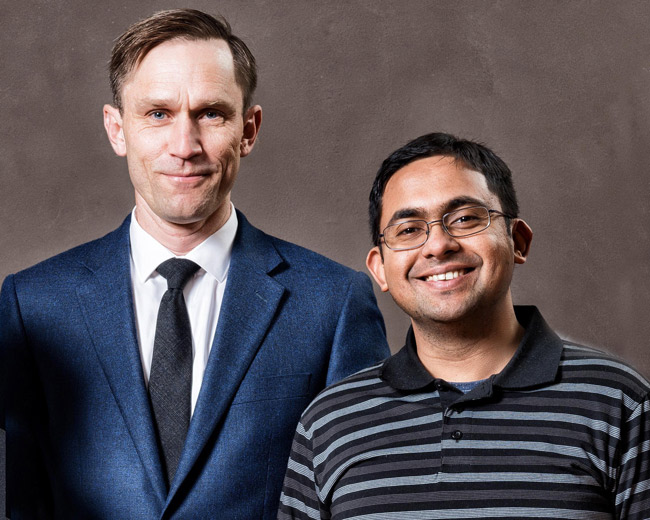
Associate Professor Niels Kjærgaard (left) and Dr Amita Deb of Physics have won this year's Proof of Concept competition with an ground-breaking imaging project.
A ground-breaking proposal that would allow photos and videos to be taken through solid objects has won Otago Innovation Ltd's 2018 Proof of Concept competition.
The proposal, by Dr Amita Deb and Associate Professor Niels Kjærgaard of the University's Department of Physics, sounds like Science Fiction – but is possible through the pair's specially developed sensor.
Dr Deb, an Otago Research Fellow who received his PhD in atomic and laser physics from Oxford University, says normal photography involves a camera shutter opening and exposing the camera's sensor to light.
“However, this does not work when you've got a barrier that is opaque to light in the way.”
"It shows the work we are doing in the Physics Department can lead to commercially appealing technologies."
Their proposal overcomes this by converting a format of electromagnetic waves that can pass through many kinds of objects to a format that can be detected by a regular camera.
Dr Deb and Associate Professor Kjærgaard will use the $60,000 prize to develop the technology further.
Dr Deb says the proposal has many applications from military to healthcare, and could revolutionise imaging.
This is just the second time someone from outside the Division of Health Sciences has won the Proof of Concept grant in the competition's 12 year history, and the first time anyone from the Division of Sciences has won.
What makes the achievement even more exciting, is that the second ranked project was also submitted by researchers from the Department of Physics.
Dr Sam Lowrey and Associate Professor Zhifa Sun's proposal aims to improve efficiency of heat exchanger units in domestic and industrial settings.
Otago Innovation Ltd Chief Executive David Christensen says this year's competition was highly competitive, with 14 of the 17 applications being shortlisted for presentation to the judges.
"Amita and Sam are wonderful examples of early career Research Fellows looking to push their research towards technology transfer. We are very proud of them, and their successes."
“It's huge for them and also for us to be working in this space. The development of technologies within the Life Sciences takes a long time, so we hope we will be able to move things a little faster working in the Physical Sciences.”
Judging took place over two days at the end of last month, by a panel which included prospective investors from New Zealand and overseas.
Dr Deb says he and Associate Professor Kjærgaard were really excited to win the competition.
“It's an endorsement in some sense that the work we've been doing is likely to make an impact,” he says. “It shows the work we are doing in the Physics Department can lead to commercially appealing technologies.”
Head of the Department of Physics Professor Craig Roger says he feels lucky to be HoD of a Department full of strong researchers – “spanning the range from Marsden-supported basic science, Centres of Research of Excellence and National Science Challenges, MBIE funded applied projects, through to research ready for commercialisation”.
“Amita and Sam are wonderful examples of early career Research Fellows looking to push their research towards technology transfer. We are very proud of them, and their successes.”
